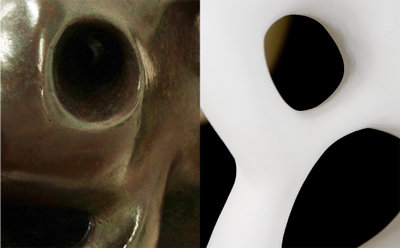Two Exhibitions
dal 23/4/2009 al 21/5/2009
Segnalato da
Sandra Blow
Sam Francis
Steven Gontarski
Barbara Hepworth
Arabella Hope
Des Hughes
Albert Irvin
Hannah Maybank
Henry Moore
Ben Nicholson
Lucy Stein
Miranda Whall
Flora Whiteley
23/4/2009
Two Exhibitions
Gimpel Fils, London
Continuity brings together a group of artists from different generations who grappled and continue to grapple with the features of modernity identified by Clement Greenberg in his essay Modernist Painting, written in 1961. Downstairs, a two person exhibition with works by Miranda Whall and Flora Whiteley.

Continuity
Sandra Blow, Sam Francis, Steven Gontarski, Barbara Hepworth,
Arabella Hope, Des Hughes, Albert Irvin, Hannah Maybank,
Henry Moore, Ben Nicholson, Lucy Stein
In his essay Modernist Painting, written in 1961, Clement Greenberg set
out a defence of modern art based on the notion of historical
continuity. This exhibition brings together a group of artists from
different generations who grappled and continue to grapple with the
features of modernity identified by Greenberg.
Greenberg wrote: "Modernist art develops out of the past without gap or
break, and wherever it ends up it will never stop being intelligible in
terms of the continuity of art". This exhibition seeks to make links
between contemporary art practice and that of earlier 20th century
modernists in order to demonstrate that artistic concerns with shape,
balance, scale and colour remain current. Similarities in colour and
painterly texture may be found between the white paintings of Sam
Francis and Sandra Blow, made in 1955 and 1961 respectively. At the same
time, the intersection of horizontal and vertical planes in the recent
work of Arabella Hope could be regarded as a contemporary echo of Blow's
composition.
The sculptural works of Steven Gontarski, Barbara Hepworth, Des Hughes
and Henry Moore included in this exhibition each address the notion of
spatial completeness. In 1937 Moore observed that "A hole can itself
have as much shape-meaning as a solid mass" and through their engagement
with the interplay between mass and void, balance and scale, these
artists demonstrate how qualities of the sculpted form continue to be of
fundamental importance.
For Greenberg, recognising art's historical lineage was important
because he suggested that it is through art's engagement, response and
divergence with the past that it is able to sustain itself into the
future. Throughout his career Albert Irvin has consistently cited JMW
Turner as a major influence; Hannah Maybank's textured monochrome works
recall the organic underpinnings of Ben Nicholson's sculptural reliefs;
while Lucy Stein's gestural oil canvases demonstrate how a contemporary
female painter can productively respond to Expressionism. While
post-modernism expanded the field of art practice, theory and subject
matter, and Greenberg's writings have been widely critiqued and
problematised, as this exhibition demonstrates, the questions of
continuity and departure remain relevant.
......................................
Miranda Whall and Flora Whiteley
Miranda Whall: Mother/Fucker
Miranda Whall's work probes taboos and expectations surrounding female
identity and expression within social, political, cultural, animal and
natural environments by creating humorous and unlikely scenarios between
herself and other things. Most well known for her watercolour animations
and paintings combining giant garden birds perched on the knees and
heads of masturbating self portraits, her new video triptych takes its
starting point from Gustave Courbet's painting L'Origine du monde, 1866.
While Courbet's semi-pornographic depiction of female genitalia portrays
a mute, passive and disembodied fragment of a woman, presented for
voyeuristic titillation, Whall's video work is active, vocal and
literally full of life. Whall has digitally transplanted the genitals of
Courbet's model onto her own body in its 29th week of pregnancy.
Literally lying behind the fragment of Courbet's painting, Whall
presents herself as both sexually demonstrative and obviously
procreative. While she recites a list of gynaecological symptoms
experienced during pregnancy and describes explicit sexual needs, her
round belly moves with her breath and unborn life.
Miranda Whall received her MA in Fine Art from the Royal Academy Schools
in 1996. She has exhibited widely including the solo exhibition Twirly
Whirly at Glasgow International, 2006 and recent group shows The Future
Can Wait, Schuster Gallery, Berlin, 2009; The Animal Gaze, Plymouth Arts
Centre, 2009; Future50, LS1 Project Space, Leeds, 2008; The Golden
Record, The Collective Gallery, Edinburgh, 2008; and You Shall Know Your
Velocity, Baltic, Gateshead, 2006.
Flora Whiteley: The Ceremony
Seen collectively Flora Whiteley's paintings construct uncertain and
inconclusive narratives. Although her scenes are familiar- a girl
smiling and waving, a group of people dancing, a tired face resting on a
desk top- they nonetheless remain strange and unfathomable. Whiteley's
use of unnaturalistic colour, including acid green and bright pink,
suggests that these paintings are heightened fragments, the product of a
sharp but also hazy memory. Exploring the melodrama of everyday life,
Whiteley sources her compositional elements from found images, in
magazines, photographs, and newspapers. However, although these scenes
might have originated from the real world, Whiteley's painterly
treatment embellishes and distances them from it. Exploring the
difficulty of communication and the construction of narrative in visual
formats, her paintings explore the fluidity and ambiguity of time and
place.
Flora Whiteley received her MA in Fine Art from Chelsea College of Art
and Design in 2008. She has exhibited in numerous exhibitions including
Day after day after day, The Star and Shadow, Newcastle upon Tyne, 2009;
Harry Smith Anthology Remixed, Sensoria Festival, Sheffield, touring to
The Centre for Contemporary Arts, Glasgow, 2008; and Better Place
Portraiture, collaborative performance with Darren Banks, at mima,
Middlesbrough, 2006. Her solo show Through dark glasses was held at
Vane, Newcastle upon Tyne in 2008. She was recently awarded an Arts
Council England Research and Development grant.
Gimpel Fils
30 Davies Street - Londo
Gallery opening hours: Mon - Fri 10am - 5.30pm, Sat 11am - 4pm
Free admission



